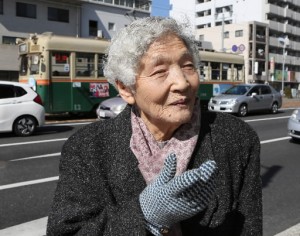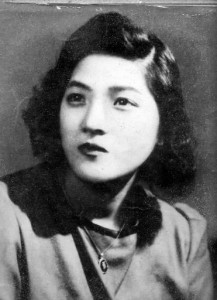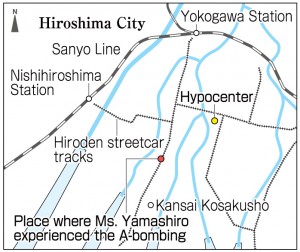Eiko Yamashiro, 92, Nishi Ward, Hiroshima
Apr. 12, 2016
Overcoming the shock of losing the sight of her left eye
by Yuji Yamamoto, Staff Writer
Eiko Yamashiro (née Kaneshina), 92, still thinks back to the atomic bombing in her day-to-day life, such as times when talking to other people. Because of the bombing, she lost the sight of her left eye. When she feels the gaze of others, and wonders if they’re focused on her eye, a wave of chagrin and sorrow wash over her. But the kind people she has met in her neighborhood have helped her to appear in public without fear.
When Ms. Yamashiro was 21 years old, she was working in the office at Kansai Kosakusho, a munitions factory located in Funairi Kawaguchi-cho (now part of Naka Ward). On August 6, 1945, she was supposed to travel to the Kure Naval Arsenal, located in the city of Kure. However, she had left behind a document that was needed to board the train and so was heading back to the factory by streetcar to retrieve it.
When the streetcar approached Funairi Nakamachi (now part of Naka Ward), about 1.2 kilometers from the hypocenter, Ms. Yamashiro saw a flash of orange and red light. As soon as she ducked down on the floor, she heard an explosion, then the streetcar suddenly stopped. Everything went black, and a hissing sound, and smoke, began rising from the floor. Ms. Yamashiro feared she would burn to death if she stayed in the streetcar. She slapped the driver on the back, but he made no response, so she groped toward the door, shoved open a gap, and escaped.
As she crawled away on the ground, her surroundings gradually grew lighter. Seeing collapsed or burning houses along the streetcar line, she could only imagine that something awful had happened because of a rail accident. When she arrived back at the factory, a mobilized student who was putting out flames on the roof of the auditorium of Hiroshima First Municipal Girls’ School (now Funairi High School), said, “The entire city is on fire.” That was when she first realized that Hiroshima had been hit by an air raid and that she was injured.
She began to head home toward the Koi district (now part of Nishi Ward) with a mobilized student from First Hiroshima Prefectural Junior High School (now Kokutaiji High School) and a worker at the plant. They swam across a river and reached her home, its walls now collapsed. Her father was badly burned, from his back to his feet, and her mother and elder sister also suffered burns. Her younger sister, who was a first-year student at Nishi Girls’ High School (it closed because of the atomic bombing), had gone to the Dobashi district (now part of Naka Ward) before the A-bomb attack to help with the war effort. She was involved in tearing down homes to create a fire lane in the event of air raids. Ms. Yamashiro returned to the city center, again with Mr. Yoshimura, to search for her.
They moved along the streetcar tracks, passing by men, women, and children. Their burnt skin was peeling away from their bodies, their hair was singed, and their scorched clothing had left them nearly naked. They were tottering and pleading for water, the children calling out for their parents. Many people who had been wounded were lying on the bank of the Tenma River, near Dobashi. Ms. Yamashiro called her younger sister’s name to each one, but very few even responded. Her sister was never found.
Ms. Yamashiro’s elder brother, a military physician who had been expected to be the mainstay of the family, was killed on Leyte Island in the Philippines during World War II. Moreover, around autumn, when something got in her eye and she closed it, her surroundings went dark: Her left eye had become blind. She went to the hospital, but the cause of her blindness could not be determined and the treatment did not go well. She was shocked all the more because she was fond of sports and quite active in her youth.
When Ms. Yamashiro was in her 40s, a doctor told her that the effect of the A-bomb’s radiation was to blame. She grew more distressed when a coworker teased her about her eye, and became resolved not to talk about her experience of the bombing.
From there, she spent her days concerned over what others thought of her left eye, but in her 80s, she had a change of heart when she began attending a class for local residents at nearby Suzugamine Elementary School in Nishi Ward. Her classmates encouraged her, saying they looked up to her as an elder, and their kindness moved her deeply. Last year, for the first time, she shared her experience of the atomic bombing, and her terrible hardships, with others.
Ms. Yamashiro then also shared her experience with the children at Suzugamine Elementary School. She was happy with the response of the next generation, who listened to her story intently and told her what they thought about war and peace. The war stole away the lives of her brother and her sister and turned her own life upside down. “War must not be waged because it destroys everyone’s hopes and dreams, and leaves all of us sad,” she said. “I hope that everyone in the world will help each other and feel happy in their lives.” She holds that vision of the future in her mind.
Teenagers’ Impressions
Left with deep psychological scars from A-bombing
Ms. Yamashiro said that she feels people are looking at her blinded eye when she talks with them. I realized that, even today, the atomic bombing continues to cause people to suffer. I also felt that it might be impolite to look into her eyes while talking to her. I cast my eyes down at my notepad because I didn’t want to make her uncomfortable. I would like to take her experience, and her feelings, to heart. (Miki Meguro, 13)
Numb feelings of war are frightening
Looking back on the time of the atomic bombing, Ms. Yamashiro said she just felt numb when she saw people who suffered burns and the many bodies that were floating on the river. If I saw scenes like that today, I would be too scared to stay calm. We shouldn’t forget that war is really frightening, not only because it harms people physically, but because it also numbs their feelings. (Hinako Okada, 13)
Trusting people around her
Ms. Yamashiro talked happily about her interactions with the other students in the class she attends and said that she always looks forward to the next class meeting. It’s important that she has people around her that she can trust enough to talk about her painful experience of the atomic bombing. In this way, they began to care about each other. I would like to be the kind of person who pays careful attention to the other people around me. (Shino Taniguchi, 17)
(Originally published on February 16, 2016)










